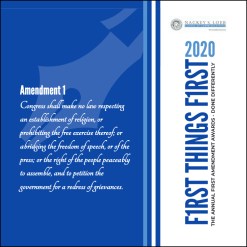This essay originally appeared in F1rst Things F1rst, a publication by the Nackey S. Loeb School of Communications. Click here to learn more.
By Gregory V. Sullivan
 We the people of the United States enjoy a system of government wherein our three branches, executive, legislative and judicial are intended to provide checks and balances upon the others. Balancing individual freedoms and other societal interests is the work of our government, as laid out in the Constitution.
We the people of the United States enjoy a system of government wherein our three branches, executive, legislative and judicial are intended to provide checks and balances upon the others. Balancing individual freedoms and other societal interests is the work of our government, as laid out in the Constitution.
That system, led by elected representatives and their appointees cannot endure unless supported by the true fuel of democracy, an informed citizenry.
The First Amendment guarantees five basic freedoms: freedom of religion, speech, press, assembly and to petition the government for a redress of grievances. These sacred freedoms are not absolute. Obscenity, defamation, bribery, perjury, true threats, child pornography, anti-trust conspiracies, false advertising and solicitation to commit murder are classes of speech that get no First Amendment protection.
During the past 100 years the courts, federal and state, have wrestled with the clash between free expression on the one hand and public safety and national security on the other. The framers of the Constitution and the Bill of Rights sought to protect the citizens of the new nation from federal interference with their thoughts and discourse on national policies.
The roots of this concept are traced back to English scholars like John Stuart Mill and John Milton. Milton, in 1644, wrote that truth will ultimately prevail over falsehood given free and unlimited debate on political issues.
In the early part of the 20th century, United States Justices Louis Brandeis and Oliver Wendell Holmes brought this “marketplace of ideas” theory into our First Amendment jurisprudence. In 1927, Justice Brandeis wrote that:
“[t]hose who won our independence believed that the final end of the State was to make men free to develop their faculties… They believed liberty to be the secret of happiness and courage to be the secret of liberty. They believed that freedom to think as you will and to speak as you think are means indispensable to the discovery and spread of political truth… that the greatest threat to freedom is an inert people; that public discussion is a political duty; and that this should be a fundamental principle of the American government.”
In times of war and peace the Supreme Court of the United States has defined, protected and sometimes limited our First Amendment freedoms. During World War II the Court, in upholding a disorderly conduct conviction of a New Hampshire resident for speaking disrespectfully to a constable stated:
“[t]here are certain well-defined and narrowly limited classes of speech, the prevention and punishment of which have never been thought to raise any Constitutional problem. … the lewd and obscene, the profane, the libelous, and the insulting or ‘fighting’ words — those which by their very utterance inflict injury or tend to incite an immediate breach of the peace. Such utterances are no essential part of any exposition of ideas, and are of such slight social value as a step to truth that any benefit that may be derived from them is clearly outweighed by the social interest in order and morality.”
Fortunately, the Supreme Court has not invoked the “fighting words” doctrine to infringe any American’s First Amendment freedoms since the Chaplinsky decision.
In 1989, in overturning a conviction for burning the American flag, the Court held that “if there is a bedrock principle underlying the First Amendment it is that the government may not prohibit the expression of an idea simply because society finds the idea itself offensive or disagreeable”.
The First Amendment must protect even the most controversial speech to counter the tyranny of the majority, to keep our government open and honest, and to move America towards a more perfect union. Our speech, assembly, petition and press rights are only fully potent when accompanied by the right to know what the government is up to. The First Amendment and the Constitution of New Hampshire provide us with the tools needed to shine the light of public scrutiny on governmental actions.
Since 1925 the First Amendment has been held to apply to all governmental actors, federal, state and local, and it applies only to governmental action.
Given today’s turbulent political climate we must be ever mindful of the sacred principles underlying the First Amendment. It is the cornerstone of democracy. Our speech, assembly, petition and press rights form the basis for Americans’ right to know what our government is up to, and to effectuate appropriate and meaningful change.
The First Amendment and the Constitution of New Hampshire provide us with the tools needed to shine the light of public scrutiny on governmental actions. We, as inheritors of this great system, have the obligation and duty to be ever vigilant in protecting these rights for ourselves and for those who come after us.
Gregory V. Sullivan is a member of the NEFAC Board of Directors, president of Malloy & Sullivan and a member of the Nackey S. Loeb School.
NEFAC was formed in 2006 to advance and protect the Five Freedoms of the First Amendment, including the principle of the public’s right to know. We’re a broad-based organization of people who believe in the power of an informed democratic society. Our members include lawyers, journalists, historians, academics and private citizens.
Our coalition is funded through contributions made by those who value the First Amendment and who strive to keep government accountable. Please make a donation here.
Major Supporters of NEFAC include Hearst Connecticut Media Group, The Boston Globe, Paul and Ann Sagan, WBUR, Boston University and the Robertson Foundation.
